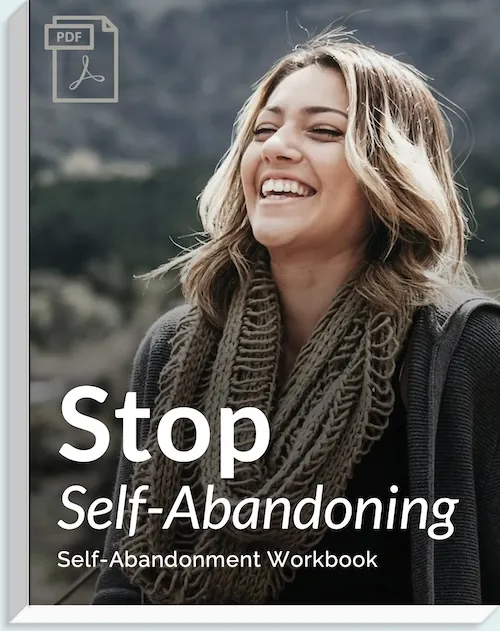How Your Inner Child Drives People-Pleasing (And Self-Abandonment)
We all know that feeling – the rising panic when it seems like someone’s upset with us. Maybe it’s a friend who goes silent, an email that feels a little too short, or that subtle, dreaded look of disapproval. Before you know it, your mind is spiralling, and your body is on high alert.
Sound familiar? That anxiety you’re feeling isn’t just about avoiding conflict or keeping the peace. It’s much deeper, and it’s connected to something most people overlook: your inner child.
What is the inner child?
Your inner child is the younger, emotionally driven part of you that still carries the beliefs, lessons, and wounds from your early experiences. These early moments shaped your understanding of love, safety, and acceptance – and they’ve stuck with you.
While your adult self may be doing a stellar job of navigating life on the surface, your inner child is still clinging to the survival tactics it learned when you were younger. It whispers things like, “If I mess this up, I’ll lose their love,” or “I need to keep everyone happy, or I’ll be abandoned.”
And whether or not you realize it, that inner child’s voice is driving a lot of your behaviour today, especially when it comes to people-pleasing.
How childhood beliefs shape people-pleasing.
At some point in your life, being the “good kid” felt like the only way to secure love and approval. Whether it was excelling in school, staying quiet when tensions rose, or constantly making others happy, you learned that being agreeable kept you safe. Over time, this became more than just a habit—it became your belief system.
Here’s the twist: Love, attention, and approval in your childhood might not have been as unconditional as you thought. If praise and affection were only offered when you behaved a certain way – like following the rules, helping out, or getting good grades – you began to internalize a dangerous message: I need to earn love by being good, by being easy, by being what others need me to be.
These conditional experiences teach us that love and approval are transactional. And as children, we don’t have the emotional sophistication to separate those conditions from our sense of self-worth. So we internalize the belief that if we don’t make others happy, we’re not worthy of love or safety.
Here are some of the core beliefs that stem from these childhood experiences and continue to fuel people-pleasing well into adulthood:
- If someone is mad at me, I am not safe.
- If I am difficult or “bad”, I’m not loveable.
- If I disappoint someone I’m unworthy of love.
- If I don’t know where I stand with someone, I’m not safe.
- I must please others to be seen as lovable and worthy.
- When people are disappointed in me, I am worthless.
The kicker? These beliefs aren’t just abstract ideas, they’re mostly unconscious and live in your subconscious mind, so they’re woven into how your body reacts to stress, conflict, and disapproval. That’s why they make you prioritize others’ needs over your own, often at the expense of your own well-being.
How these beliefs are reinforced.
Once these beliefs are formed, they don’t just sit quietly in the background – they become the lens through which you experience the world. And childhood dynamics often reinforce them in ways that are subtle but powerful. Here’s how:
- Conditional Love or Approval: If your worth was tied to meeting specific expectations (being “good,” achieving certain results), you internalized the idea that love has to be earned. This belief sticks with you and shows up in your adult life every time you prioritize someone else’s happiness over your own.
- Conflict Avoidance: If your family avoided conflict or downplayed uncomfortable emotions, you learned that keeping the peace was essential to maintaining safety. So now, even minor tension can trigger an outsized reaction, pushing you to people-please to avoid any perceived danger.
- Emotional Withdrawal: If caregivers withdrew emotionally when they were upset, you likely learned to associate someone’s anger with rejection. As an adult, this manifests as anxiety anytime you feel like someone is disappointed in you. It’s no wonder you scramble to fix things as quickly as possible.
- Modelling from Caregivers: If you grew up watching your parents or guardians people-please, defer to others, or avoid conflict at all costs, you absorbed that behaviour as a way to navigate relationships. It’s not just something you learned – it’s something you lived.
By the time you’re an adult, these behaviours feel automatic. The idea that someone’s anger or disappointment could make you feel unsafe isn’t an intellectual concept – it’s a physical reaction. Your heart races, your stomach tightens, and your mind goes into overdrive trying to make things right. This isn’t just anxiety – it’s your inner child, still doing its best to protect you.

How people-pleasing becomes self-abandonment.
At its core, people-pleasing is self-abandonment. Every time you say “yes” when you want to say “no,” or stay silent to keep the peace, you’re neglecting your own needs. This behaviour stems directly from the inner child, who learned that making others happy was the key to feeling safe and loved.
It’s the moment you turn down your own needs, silence your voice, or override your truth to keep someone else comfortable. And most of us have done it for so long, we don’t even realize we’re doing it. That’s how deeply self-abandonment is woven into the fabric of people-pleasing.
But now, as an adult, abandoning yourself no longer serves you – it keeps you stuck in patterns of anxiety, resentment, and exhaustion. Healing people-pleasing means reconnecting with your inner child and learning to prioritize your own needs without the fear of losing love or approval.
Ready to take action? Here’s an exercise to get you started.
If this resonates, it’s time to take a closer look at your own people-pleasing tendencies. Grab a journal and reflect on these questions:
- Think of a recent time when you people-pleased.
What happened? How did you feel emotionally and physically in that moment? Write down the details. - What did you believe about yourself in that situation?
Did you feel like you had to keep the peace? Did you think disappointing someone would make you unlovable? Write down the thoughts that ran through your mind. - Where did that belief come from?
Can you trace it back to a moment in childhood? What were the circumstances? Reflect on how this belief was formed. - What would it look like to let go of that belief?
Imagine how you would behave if you no longer believed you needed to please others to be safe or loved. How would you approach that situation differently?
These reflective exercises are the first step toward recognizing and unraveling the patterns that keep you stuck. The more you explore, the more you’ll realize that your people-pleasing tendencies aren’t who you are – they’re survival strategies you can unlearn. If you’re ready to stop people-pleasing and start showing up for yourself, check out my free workbook below.
The Stop Self-Abandoning workbook gives you the tools to stop suppressing your needs and start honoring your truth – without guilt.
You know it’s time to stop abandoning yourself.
This free workbook is your first step to reclaiming your power.
You’ve spent long enough putting everyone else’s needs ahead of your own – pretending everything’s okay when it’s not.
It’s time to come back to yourself. It’s time to take your life back.
“I was shocked at what I learned about myself and this pattern and how it’s been robbing me of my peace.”
Heather – Reader








